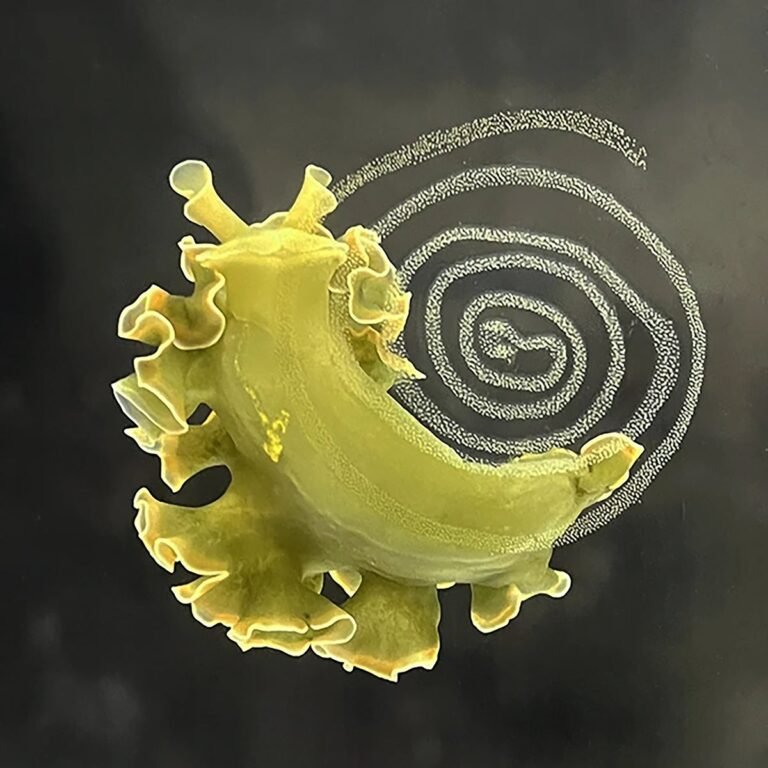This Solar-Powered Slug Steals Photosynthetic Machinery for Emergency Food
A certain species of sea slug steals chloroplasts from algae and houses its contraband in special organelles that it can raid for food in times of need
Sea slugs in the genus Elysia are bright green because they store chloroplasts, the organelles that make energy in plants.
‘Solar-powered’ sea slugs have specialized depots in their cells that store photosynthetic equipment looted from algae, a study reports. These depots provide just the right chemical environment to keep the stolen apparatus, called chloroplasts, alive and working to turn sunlight into nutrients.
“It was the wildest thing that we had seen,” says study co-author Nicholas Bellono, a biologist at Harvard University in Cambridge, Massachusetts. The authors also found that, in lean times, the slugs can raid these compartments to consume chloroplasts.
The compartment “is basically like a moving refrigerator of chloroplasts where, after a period of starvation, the slugs can switch from storage to consumption to survive”, Bellono says.
On supporting science journalism
If you’re enjoying this article, consider supporting our award-winning journalism by subscribing. By purchasing a subscription you are helping to ensure the future of impactful stories about the discoveries and ideas shaping our world today.
The findings were published in Cell.
Green grazer
Scientists discovered decades ago that certain species of sea slug store chloroplasts from the algae they eat, a diet that can turn the slugs bright green. But no one understood how the slugs keep these foreign organelles alive without the support of the rest of the algal cell.
Bellono and his team added chemical tags to proteins newly made by the slugs’ own cells. They found that most of the proteins in a slug’s chloroplasts were made by the slug — not by the original algae. That meant the slug was helping to maintain the chloroplasts.
When the scientists looked at the chloroplasts under a microscope, they found that the organelles were housed in special compartments in the slugs’ guts. Each compartment was surrounded by a membrane that tested positive for markers typically found in cellular structures called phagosomes, which fuse with other structures called lysomes to digest unneeded organelles. The researchers named this structure the kleptosome, after a Greek word that means to steal.
Life of crime
The team also found that these organelles contained ion channels — receptors that convert chemical messages into electrical signals. Among them is one called P2X4, which opens in response to the presence of ATP, an energy-carrying molecule produced during photosynthesis.
When Bellono and his team blocked this channel in slugs’ kleptosomes, oxygen production from photosynthesis dropped, showing that the kleptosome is actively involved in keeping the chloroplasts functioning.
Having discovered the existence of the kleptosome, the researchers wondered whether it helps the slugs to resist starvation. They compared the solar-powered slug Elysia crispata with Aplysia californica, a non-photosynthetic slug that lacks kleptosomes. Aplysia died after three to four weeks without food, whereas Elysia could survive for up to four months. Yet, after four weeks, the Elysia slugs lost their green colour, turned orange — just as leaves do in autumn — and stopped photosynthesizing.
After four weeks of food deprivation, green Elysia sea slugs turn orange.
Microscopy revealed that the Elysia’s kleptosomes had begun fusing with lysosomes and that the colour change was caused by the degradation of the chloroplast.
The study is “remarkable,” says cell biologist Elena Oancea at Brown University in Providence, Rhode Island. Studying the molecular and cellular processes of creatures as small as sea slugs is extremely challenging, she says. “It takes a lot of courage to do that.”
The discovery of the kleptosome could help to answer broader questions about organelle evolution and other cellular processes that we don’t understand yet, Oancea says. All life is built on cells, she adds: “It’s the basic principle of nature.”
This article is reproduced with permission and was first published on June 25, 2025.
